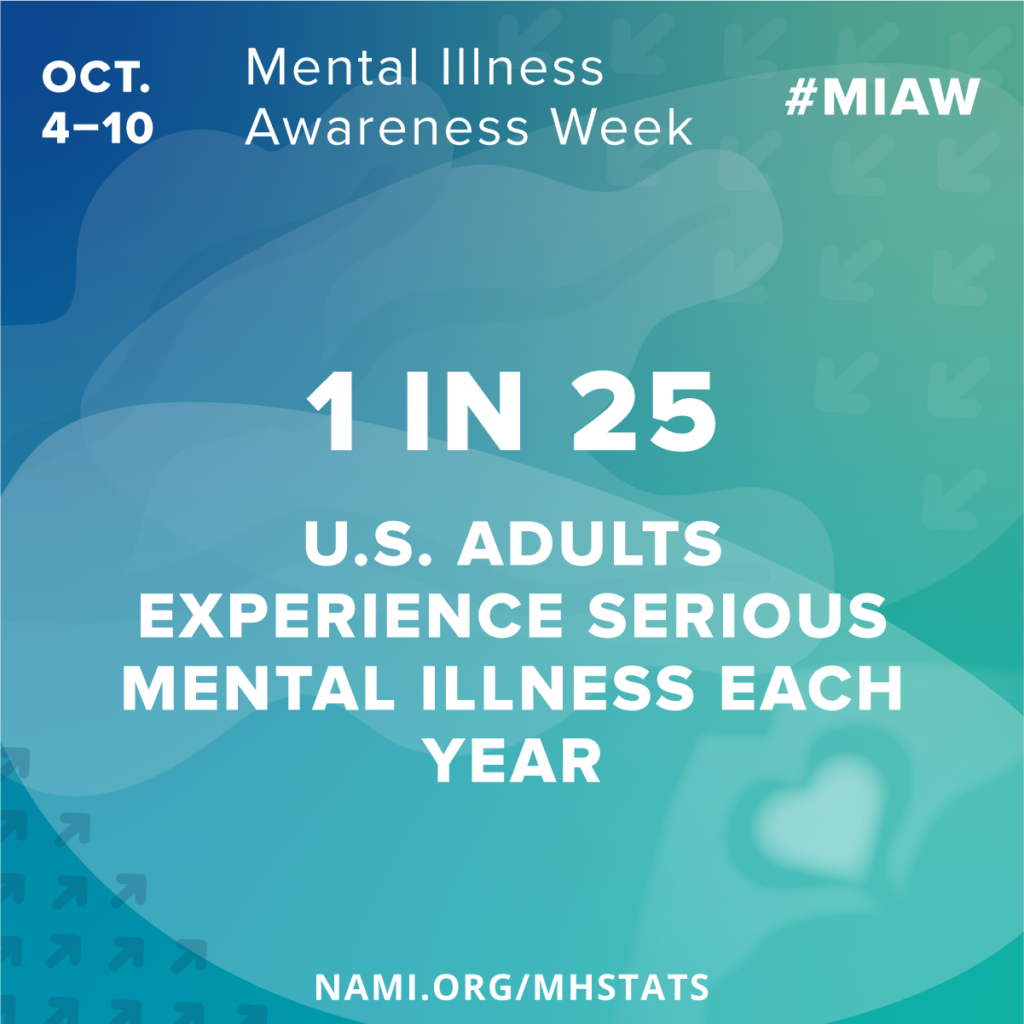With National Recovery Month and Suicide Prevention Awareness Month behind us, the focus on mental health continues. While it’s vital to remember that raising awareness about addiction and mental illness is a year-round effort, the first full week of October is of significant importance. National Mental Illness Awareness Week (MIAW) runs from October 4 – 10.
Right now is an unprecedented time of isolation, and it is critical to remind people suffering from mental health disorders that they are not alone. One in five U.S. adults experiences mental illness each year.
The National Alliance on Mental Illness (NAMI) encourages everyone to take part in MIAW. The organization provides many avenues for participation, from sharing one’s story of recovery and hope and by posting mental illness-related content on social media platforms.
There are also mental health-related events throughout MIAW, including:
- Tuesday Oct. 6: National Day of Prayer for Mental Illness Recovery and Understanding
- Thursday Oct. 8: National Depression Screening Day
- Saturday Oct. 10: World Mental Health Day
- Saturday Oct. 10: NAMIWalks National Day of Hope
At PACE Recovery Center, we hope you find time to help NAMI raise awareness about mental illness. Mental health disorders affect men and women around the globe. Depression alone impacts the lives of more than 300 million people, according to the World Health Organization (WHO). Moreover, depressive disorders are the number one cause of poor health worldwide. NAMI writes:
Each year, millions of Americans face the reality of living with a mental health condition. However, mental illness affects everyone directly or indirectly through family, friends or coworkers. Despite mental illnesses’ reach and prevalence, stigma and misunderstanding are also, unfortunately, widespread.
Getting Involved With MIAW 2020
You Are Not Alone is a year-long awareness campaign. NAMI invites people living with mental and behavioral health disorders to share their experience, strength, and hope. Doing so encourages men, women, and teenagers to ask for help before one’s condition worsens. The majority of people who experience suicidal ideations or commit suicide struggle with symptoms of mental illness.
When people affected by mental illness share their stories, they help fight stigmas that stand in the way of recovery for millions of Americans. The recovery community’s stories help the public understand that mental and behavioral health disorders are not a choice. As such, members of society are less likely to stand by or spread misinformation.
You can read some other people’s experience, strength, and hope here. This Sunday, you can also start posting to social media about mental health. You can create unique status updates to attach to infographics. You can also utilize NAMI sponsored posts, such as: Many Americans do not realize how common mental illness is, even when it affects someone they love. Since mental health is still a taboo topic to discuss, the ubiquity of psychiatric disorders is often overlooked. Below you will see a snapshot by demographic; according to NAMI, mental illness affects: PACE Recovery treats adult men living with mental health and co-occurring disorders. Our team utilizes the latest evidence-based treatment modalities to facilitate long-term recovery. Mental Illness Awareness Week is an ideal opportunity to disregard stigma and reach out for assistance. We are standing by around the clock to field any questions you have about our programs and services. Please call 800-526-1851 for more information.Mental Illness Awareness Over Social Media
More Facts About Mental Illness
Mental Health Treatment for Men



